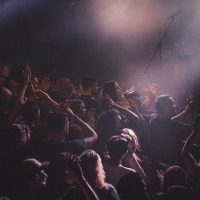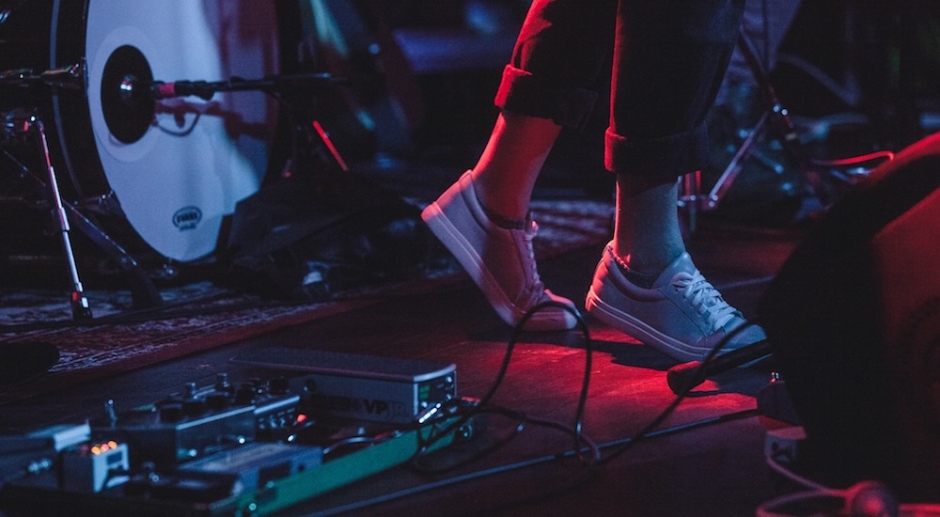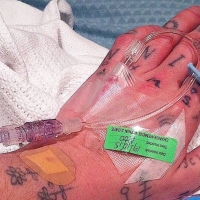 We asked a Uni professor for advice on making music venues/events safer spacesUNSW's Dr Bianca Fileborn will be speaking at this month's Electronic Music Conference.
We asked a Uni professor for advice on making music venues/events safer spacesUNSW's Dr Bianca Fileborn will be speaking at this month's Electronic Music Conference.

We talk gender bias with APRA AMCOS & Picnic Events ahead of EMC
Jana Gibson and Carly Roberts talk gender ahead of Electronic Music Conference this month.
Electronic Music Conference 2017 visits Sydney's Redfern for a two-day program seeing international music leaders and industry experts appear across an array of panels, talks, workshops, parties and masterclasses on November 29-30. Tickets are on sale now via electronicmusicconference.com, with tickets to the Conscious/Unconscious Gender Bias Panel available HERE.
In a recent piece exploring the representation of women, trans and non-binary performers, and performers of colour on Australian festival stages, we asked several prominent Australian musicians from these backgrounds – Yeo, Ngaiire, OKENYO and Rachel Maria Cox – on what should be done to increase the representation of these groups in our music industry, both on our stages and behind the scenes. The consensus was that the change must come from within the music industry, whether it's prominent industry figureheads encouraging more women and people of colour to take on higher, more important roles within the companies or whether it's these figures using their platforms and voices to promote people from these backgrounds better.
The Conscious/Unconscious Gender Bias panel at this year's Electronic Music Conference aims to discuss the initiatives currently in place (and those coming into place in 2018) to increase the representation of non-males in our music industry, using a number of female and non-binary industry heavyweights to get the point across – LGBT+ DJ and producer Brooke Powers, APRA AMCOS' Jana Gibson, Picnic Events' Carly Roberts, and Jungle's Chloe Rickard. Ahead of the panel, which you can get tickets to HERE, we asked Jana Gibson from APRA AMCOS and Picnic Events' Carly Roberts on what they (and their respective companies) are doing to reduce the white male bias in the Australian music industry, as well as a bunch of other super important things which you can check out below:

APRA AMCOS' Jana Gibson on what APRA AMCOS are doing to reach an equal Australian music industry:
Three years ago, APRA AMCOS undertook an internal review of the organisation through consultation with senior-level female professionals and established programs to support and promote the professional pathway of women within the company. This included a renewed policy in relation to flexible work arrangements, a grant program to provide funding for further education externally, and internal initiatives such as mentoring and training for personal skills development in areas such as public speaking.
This led to a focus on the low female representation within the membership. 21.7% of the membership is female, and depending on the genre this percentage can drop further. We identified that screen composition was an example of this with only 13% representation of women. So to better understand the challenges and barriers to their career pathways we commissioned research through RMIT. The findings of the research were released in August this year, and APRA AMCOS have committed to improving equity within the membership and our programs.
We've implemented a 40/40/20 measure on membership programs, which will see an increase in women within our programs and initiatives including the Ambassador program, SongHubs, SongMakers and Professional Development Awards, as well as judges, presenters and performers at our Awards series. At least 40% of our national event series panellists will be female, and we'll also address female representation in terms of topics specific to their career development. The measure is about a balance, so the 40/40/20 is about having programs where there is 40% of each gender (as an individual identifies themselves) with 20% leeway. A series of mentoring opportunities are also underway across multiple genres – screen, jazz, classical, metal, and contemporary/pop - and by April next year, we’ll be delivering workshops to focus on personal and professional skills development.
We’re also ensuring men are involved in the programs to build their understanding of the challenges faced by women within career development and sharing their insights and networks.
On how these initiatives have improved the representation of women in the music industry thus far:
The announcement of the initiatives have been well received by the membership. Ensuring the membership programs we are delivering are set within the 40/40/20 measure has meant we are engaging with more women to work with us and in turn raising their profile more broadly.
We’ve not seen results from the external programs as yet as the activity has only just started, but what has been fantastic is the incredible level of support from men to be involved in the mentoring and workshops. It’s now about aligning them with the right initiatives. I think the industry at-large saw that APRA AMCOS took a stand on something, and by doing so, hopefully it heightens awareness of how real the gender imbalance is and that it can be addressed – even by a large organisation like us.
On the confidence gap between men and women in the music industry:
The RMIT research identified many barriers to career pathways, but a lack of confidence in their ability to understand the industry and a more cautious approach did rate as a key concern. Catherine Strong, who authored the findings, notes:
"While both men and women overwhelming felt that they were talented enough to succeed in the industry (93% of men and 89% of women agreed with this statement), in interviews men were much more likely to make unequivocally positive claims about their own talents and abilities. Men were more likely to ‘self-teach’, and to take on jobs requiring a skill-set they did not currently have, suggesting a level of self-confidence and willingness to take risks that women did not display to nearly the same degree. Women also felt less confident that they understood how to succeed in the industry (60% of women agreed with this statement compared to 84% of males)."
Our aim is that the mentoring program we are putting in place will begin to address the ‘confidence gap’. A key element of the findings is the importance of men being included in the conversation. Mentoring should offer both parties the chance to better understand the barriers and pathways to navigate their compositional or songwriting careers. Applying our 40/40/20 measure applies to this idea: just as we wouldn’t want an all-male panel, we won’t be encouraging all-female panels either.
I think it’s important for men and women in leadership positions to take a step back and look at the how the industry is comprised. The UK’s Music Diversity study showed how women leave the industry after their early 30s. Why is that? I think, broadly speaking, it takes strong leadership to address that and to look at ways to support and encourage women through multiple career stages. I had that sort of support at my organisation. My strengths were recognised, and I was able to make real career progression, especially in the last three years.
On how a more inclusive industry may benefit us economically:
An inclusive and equal music industry will mean no one is thinking about whether the song is written or performed by women or men as the gap won’t be glaring. It can only mean that there will be the creation of more new works – we are a collaborative industry, and a greater representation of women with different viewpoints can bring more collaborative opportunities and innovative ideas. Seeing more women creating music begets more women creating music. It helps them to know that their music is worth sharing and distributing. We’ll be hearing and seeing more women on the stage, on digital services, on the radio, and on TV. This will all lead to the generation of income from album sales and royalties to gig payments and merchandise for both themselves and the broader industry.
It won’t, however, greatly change the ongoing challenges the industry faces in an ever-evolving digital landscape and its accompanying value gap. Although, I don’t doubt having more empowered female voices at the negotiating table would help – but the greatest benefit really will be a more diverse artistic output for consumers.
Picnic Events' Carly Roberts on what Picnic Events are doing create an equal Australian live music market:
Everything is being done by Picnic to be part of the positive trend and has been since day one. As a woman who’s been DJing for over 20 years, I come from a time when there weren’t many female DJs and am therefore hypersensitive to this… I know first hand the myriad of (often pretty complex) issues around this story for women who have a passion for music – however, it calls them.
I have an approach that hasn’t really changed. Book women, don’t call them female DJs because they are in fact just straight-up DJs (some of the best around), and when the opportunity presents itself, bring women on board to work behind the scenes at Picnic. Although there are more women DJing than there used to be it’s still a pretty big boys club at my level of promoting, and it’s so nice when strong passionate girls come through.
On how these initiatives have improved the representation of women on our stages:
I can’t give you facts and figures so much, but I’d hope that my continual booking of females for the last 10 years is a considerable part of this shift – we definitely allow more females to be seen and heard. My way of never going down the “female DJ” road has also been commented on by a lot of people – it seems it’s allowed some other promoters/bookers to look at things differently too.
I know one thing for sure, and that's there are more brilliant (females who) DJ around than ever before, and I’m so glad I have a platform to create safe and quality-driven spaces for females to create in. We also run a party called HER that’s singularly focused on all female/female-identifying line-ups, and have featured KILLER DJs and producers from overseas, Melbourne and Sydney. It’s an initiative I’m super proud of and plan to continue.
On preventing the tokenism of female acts and booking quotas:
I’ve thought about this a lot actually… It’s a funny one as I really don’t do token or novelty, but recently I was booked for an event to make a statement about booking more females. I was honoured to be included in a pretty inspirational event with other women who I totally admire, and the organisers had the best interests of everyone at heart. So, maybe being ‘tokenistic’ to start a conversation around a certain issue isn’t so bad after all. I think as long as you’re booking on talent and for the right reasons then maybe - in some instances - it’s not the end of the world. I’m also aware there’d be situations very different to mine where this could be a huge problem; I can’t talk about what I don’t know though, thankfully!
On the advantages of having a more inclusive and equal music industry:
I guess in addition to women being strong as hell and entirely capable of doing almost everything a man can do, we also bring a different energy to things. We recently had a Picnic party with Prosumer – an outspoken member of the LGBTQI community – and he wrote a glowing review of our party. To summarise, he spoke about the power of a non-male-dominated female-supportive space and said that in his 20-year career, it was the first time he’d felt it to that extent, and it was positive – it was about how safe the space was for everyone in it. Working for Picnic on the night, five out of seven people were female. Including all DJs and door staff. The positive impact of this on a DJ who’s notoriously sensitive to environments made me so proud. I guess one obvious thing is the dark side of night-time entertainment; predatory males are mainly non-existent at our parties or at the venues we book. But this is also because we’re authentic, everyone is there for the music and that come as you are vibe binds everyone together. This also applies to the business side of things. The more women there are working in the industry means less pressure to speak or act a certain way or to change their natural personality in order to simply be respected in their job. The more diversity there is, the more comfortable people are to just be themselves – and I believe that’s a starting point for most real magic.
Otherwise, the benefits of having women in the music industry are the same as in any industry – and to be honest what I’d really like to say is if I have to spell that out we’ve got a long way to go.
On ways to increase the representation of women in the music industry if you're unsure how:
I would say authenticity is the best approach, and asking for introductions through mutual friends and seeking the advice from trusted figures/voices in the communities you’re keen to involve. And then follow through – the booking is only the start. Actually caring is equal to or more important than the booking.
Follow EMC: FACEBOOK
Follow APRA AMCOS: FACEBOOK
Follow Picnic Events: FACEBOOK
 We asked a Uni professor for advice on making music venues/events safer spacesUNSW's Dr Bianca Fileborn will be speaking at this month's Electronic Music Conference.
We asked a Uni professor for advice on making music venues/events safer spacesUNSW's Dr Bianca Fileborn will be speaking at this month's Electronic Music Conference.
 Melbourne musician HTMLflowers pens a guest essay on living with Cystic FibrosisHTMLflowers' collaborator-heavy debut album – Chrome Halo – is out now through Wondercore Island.
Melbourne musician HTMLflowers pens a guest essay on living with Cystic FibrosisHTMLflowers' collaborator-heavy debut album – Chrome Halo – is out now through Wondercore Island.